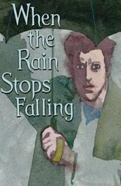Andrew Bovell on His Trek from the Australian Desert to NYC with When the Rain Stops Falling
About the author:
Australian playwright and screenwriter Andrew Bovell is best known for the mystery film Lantana (starring fellow countryman and Tony winner Anthony LaPaglia), which began life as the play Speaking in Tongues. He’s a master at setting up stage surprises, as in his current drama When the Rain Stops Falling. The play’s seven characters (including two played by different actresses at different ages) span almost a century in a family in which a single dark secret affects multiple generations. (See Broadway.com’s video feature for more details.) Before arriving at Lincoln Center Theater, the play had successful productions in Australia and at London’s Almeida Theatre, but as Bovell admits, there’s something special about seeing his work performed in the Big Apple.
![]()
I've never quite left the landscape of my childhood behind. Its presence is felt in a lot of my work. I was born in a desert, 300 miles from the nearest city, Perth, which itself is the most geographically isolated city in the world. Growing up I had time and space to fill, and in a landscape like that, you learn how to be alone. Now I'm walking down a New York street, there are people everywhere and it is snowing. And it's utterly entrancing. And I'm thinking about the distance between these two places—the Australian desert and New York City—and the distance between the child I was then and the man I am now, and I'm asking myself, to quote from a famous Talking Heads song, “How did I get here?”
I wondered if being in a New York rehearsal room would be different to what I was used to in Australia. But watching director David Cromer work with the wonderful cast of When the Rain Stops Falling felt deeply familiar, and I was reminded that in the theater we share a language that crosses national boundaries. It is a language characterized by its sense of inquiry and its investigation into the human condition. Whether we are working in Melbourne, London, New York or Skokie, Illinois, we're asking the same questions: What does this person think? What does that person feel? Why does this person do that? And when we discover answers that are unexpected and complex, we have the opportunity to create something that just might illuminate the human condition. At least that's our common aim.
As a writer I'm interested in the shape of things; in the way a playwright lays out his or her narrative and in the way they use time. Time is a central theme in When the Rain Stops Falling. The action moves back and forth over a period of 80 years from 1959 to 2039. It tells the story of two families over four generations, one in London and one in Australia, that are linked by a tragic fate. At first the different periods are clearly delineated, but as the play unfolds the different times begin to merge until finally all the characters share one time and place.
The play was written at a time when our society was preoccupied by the changing nature of the weather. Once again we were looking to the future with a sense of trepidation. A generation before, the potential for nuclear war led us to question whether humanity had the capacity to destroy itself. Now we were asking the same questions again but in relation to climate change. A sense of hopelessness pervaded the debate. It was too late. The damage was done. Future generations will suffer because of the choices we and our parents made. I felt a deep sense of melancholy about the world I lived in and the world my children would inhabit.
And yet, as I came to understand it, melancholia is not about feeling sad or hopeless. It actually describes the state of deep reflection that is necessary for change to occur. And I started to think about these times...our times...as being a time of melancholia, a time of deep reflection that will naturally precede change. This was a clear shift in my thinking, and looking back through history, I was reminded just how resilient we are. We have an extraordinary ability to survive. This is the mood from which the play sprang forth. At its simplest it is about the emotional legacy we inherit from those who came before us and the legacy we pass on to those who will follow. It is a play about human resilience and our capacity for regeneration.
Having grown up on the American classics—Miller, Williams, O'Neill, Mamet, Shepard, Kushner—as well as being familiar with the contemporary American canon, it is wonderful to have the opportunity to bring this Australian story to an American audience. For that, I thank David and the cast and creative team behind the production, Andre Bishop and Bernard Gersten and their team at Lincoln Center Theater, and the wonderful Jean Doumanian who, with Patrick Daly, found this play.
